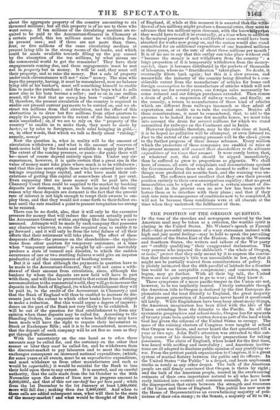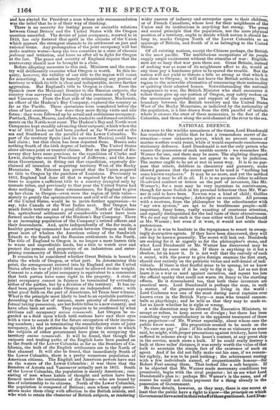THE POSITION OF THE OREGON QUESTION.
Jr the tone of the speeches and newspapers received by the last American mail may be taken as a criterion, the warlike spirit is abating in the United States. Mr. Webster's speech at Faneuil Hall—that powerful utterance of a wary statesman imbued with high and just moral feeling—may be held to speak the prevailing sentiments of the States East of the Hudson. Even in the Western and Southern States, the writers and talkers of the War party are "craftily qualifying" their exaggerated declamation. The very persons who imposed the shibboleth "the whole of Oregon, or none," protest that they only meant by it to express the convic- tion that their country's title was unassailable in law, not that it might not be partially waived from considerations of policy. It is plainly intimated that the 49th parallel of latitude for a frontier line would be an acceptable compromise ; and concession, once begun, may go further. With all their big talk, the United States are not quite prepared to go to war ; and they know it. These symptoms of a more pacific temper in the Union are not, however, to be too implicitly trusted. Utterly untenable though the American title to Oregon is declared by the first European di- plomatists and the least friendly to England, the great majority of the present generation of Americans never heard it questioned till lately. While Englishmen have been busy about many things, the American imagination has been filled with the idea of the Union extending from the Atlantic to the Pacific. In all the systematic geographies and school-books, Oregon has for upwards of twenty years been quietly written down as part of the land which God has given the citizens of the United States to occupy. The mass of the existing electors of Congress were taught at school that Oregon was theirs, and never heard the fact questioned till a year or two ago. John Bull's attention was attracted to this out- lying corner of his dominions by their preparations for taking possession. The claim of England, when heard for the first time, was heard with scoffing and incredulity ; and American institu- tions are ill adapted to disabuse public opinion of any gratifying er- ror. From the pettiest parish organization to Congress, it is a great system of mutual flattery between the public and its officers. In the United States "the Public" is a despot, and hears unpleasant truths as rarely as any other despot. The bulk of the American people are still firmly convinced that Oregon is theirs by right ; and the bulk of the American people, nursed in the overweening estimate of their own importance natural to all who have been early initiated into vestries and common councils, do not know the disproportion that exists between the strength and resources of the Union and those of England. This public has now sent to the House of Representatives an overwhelming majority of poli- ticians of their own stamp ; to the Senate, a majority of 32 to 24; and has elected for President a man whose sole recommendation was the belief that he is of their way of thinking. There is no security for lasting peace or amicable relations between Great Britain and the United States with the Oregon question unsettled. The device of joint occupancy, resorted to in 1819, has only fostered that spirit in the citizens of the Union which appears the strongest obstacle to its settlement on just and rational terms. Any prolongation of the joint occupancy will but make matters worse—keep the two countries in a state of chronic jealousy and irritation, and leave us after all to fight for Oregon at the last. The peace and security of England require that the controversy should now be brought to a close. Before adopting measures to this end, Ministers and the coun- try will deliberately examine what Oregon is worth. In this in- quiry, however, the validity of our title to the region will count for something. A nation by tamely- relinquishing any portion of territory to which its title is clear and indisputable, invites further aggression. But England's title to Oregon is clear. From the Spanish (now the Mexican) frontier to the Russian outposts, the country was surveyed and formally taken possession of by Cook and Vancouver. From the East side of the continent, Mackenzie, an officer of the Hudson's Bay Company, explored the country as far as the Pacific. These operations were completed before the close of last century. Nor were they mere flying visits and idle forms : they were followed up by actual and continuous occupancy. Portlock, Dixon, Meares, and others, traded to and formed establish- ments on the North-west coast. The Hudson's Bay and North-west Companies kept steadily advancing their outposts; which when the war of 1812 broke out had been pushed as far Westward as the sea and Southward as the parallel of the Lower Columbia. To part of the territory Spain (and its successor Mexico) could have laid claim ; but that claim has been departed from. Russia asks nothing South of the 54th degree of latitude. The United States alone advance joint or counter claims. But on the ground of dis- covery they have none previous to the expedition of Clarke and Lewis, during the second Presidency of Jefferson ; and the Ame- rican Government, in fitting out that expedition, expressly dis- claimed all intention of acquiring territory West of the Rocky Mountains. Mr. Falconer has proved that the Union acquired no title to Oregon by the purchase of Louisiana. Previously to 1812, England had done all that is required by the law of na- tions to acquire a sufficient title to a country occupied only by nomade tribes, and previously to that year the United States had done nothing. Under these circumstances, for England to give up her claim to Oregon—even were the region of little value— merely to gratify the opinionativeness and self-will of the citizens of the United States, would be to invite further aggression—to say, take Canada or the West Indies next. But Oregon has much fertile territory and a good climate. North of the Colum- bia, agricultural settlements of considerable extent have been formed under the auspices of the Hudson's Bay Company. There is an increasing population of the Company's retired officers and their descendants. And, quite independently of the fur trade, a healthy growing commerce has arisen between Oregon and that great mart of whalers the American colony of the Sandwich Islands to the South and the Russian settlements to the North. The title of England to Oregon is no longer a mere barren title to waste and unprofitable lands, but a title to watch over and protect the persons and properties of an industrious and enter- prising community of British subjects. It remains to be considered whether Great Britain is bound to claim the whole of Oregon, or what part. In determining this point, the arrangement entered into by England and the United States after the war of 1812-1813 must be allowed its due weight. Consent to a state of joint occupancy is equivalent to a concession that both parties have some right in the property. A state of joint occupancy cannot in fairness be terminated by extruding, either of the parties, but by a division of the territory. It has in- deed been proposed to make Oregon an independent state ; with what good faith on the part of Americans, let Texas bear witness. What is the principle most likely to lead to an equitable partition? According to the law of nations, mere priority of discovery, or formal taking possession, are but feeble titles to a new country, and have often been set aside. They require to be confirmed by what civilians call occupancy anima remanendi. Let Oregon be re- garded as a field upon which both nations have cast their eyes with a view to secure it for the future occupation of their increas- ing numbers ; and in terminating the unsatisfactory state of joint occupancy, let the partition be regulated by the extent to which the subjects of either government have gone in occupying the territory anima remanendi. It will be found, that though the outposts and trading paths of the English have been pushed on to the South of the Lower Columbia as far as the frontiers of Ca- lifornia, the bulk of the English settlements are to the North of that channel It will also be found, that immediately South of the Lower Columbia, there is a pretty numerous population of American citizens. The English and American powers have met on the waters of the Lower Columbia : it was there that the founders of Astoria and Vancouver actually met in 1812. South of the Lower Columbia, the population is mainly American; con- sisting of men whose habits of thought and action have been formed under the institutions of the Union—who are bound by ties of relationship to its citizens. North of the Lower Columbia, the population is composed of Britons; men whose early associ- ations make them cling with affection to the British islands, and who wish to retain the character of British subjects, as rendering wider careers of industry and enterprise open to their children, or of French Canadians, whose love for their neighbours of the Union and its institutions is anything but strong. The great and sound principle that the population, not the mere physical position of a territory, ought to decide which nation it, should be- long to, marks Oregon North of the Lower Columbia as an appanage of Britain, and South of it as belonging to the United States.
Of all existing nations, except the Chinese perhaps, the British is the most pacific. The multifarious occupations of its people supply ample excitement without the stimulus of war : English- men are so busy that war puts them out. Great Britain, instead of seeking war as some of its neighbours affect to do, would at any time pay a handsome price to be spared the trouble. But the nation will not yield to threats a title so strong as that which it can show to Oregon ; it will not leave the British settlers in that region to the miserable alternative of renouncing their nationality or quitting their adopted homes. Notwithstanding the national repugnance to war, the British Minister who shall encounter it rather than give up our portion of Oregon, may safely reckon on the unanimous approbation and support of the country. The boundary between the British territory and the United States West of the Rocky Mountains, as indicated by the nationality of the population, is a line drawn from the 49th parallel of latitude where it crosses the crest of these mountains, to the foot of the Colombia, and thence along the mid channel of the river to the sea.



























 Previous page
Previous page